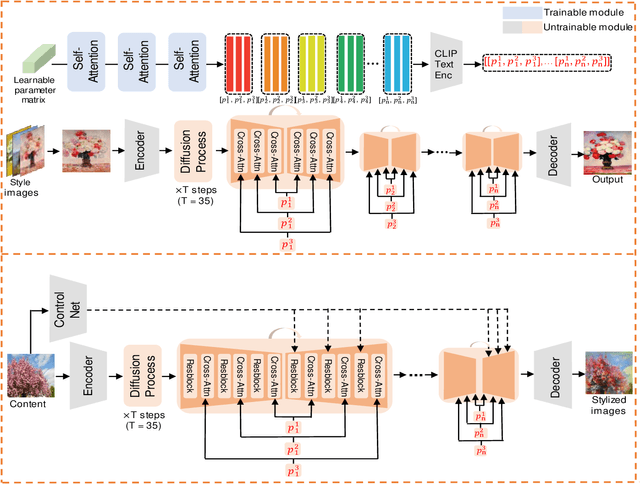Juncheng Mo
M$^2$-Miner: Multi-Agent Enhanced MCTS for Mobile GUI Agent Data Mining
Feb 05, 2026Abstract:Graphical User Interface (GUI) agent is pivotal to advancing intelligent human-computer interaction paradigms. Constructing powerful GUI agents necessitates the large-scale annotation of high-quality user-behavior trajectory data (i.e., intent-trajectory pairs) for training. However, manual annotation methods and current GUI agent data mining approaches typically face three critical challenges: high construction cost, poor data quality, and low data richness. To address these issues, we propose M$^2$-Miner, the first low-cost and automated mobile GUI agent data-mining framework based on Monte Carlo Tree Search (MCTS). For better data mining efficiency and quality, we present a collaborative multi-agent framework, comprising InferAgent, OrchestraAgent, and JudgeAgent for guidance, acceleration, and evaluation. To further enhance the efficiency of mining and enrich intent diversity, we design an intent recycling strategy to extract extra valuable interaction trajectories. Additionally, a progressive model-in-the-loop training strategy is introduced to improve the success rate of data mining. Extensive experiments have demonstrated that the GUI agent fine-tuned using our mined data achieves state-of-the-art performance on several commonly used mobile GUI benchmarks. Our work will be released to facilitate the community research.
SparkUI-Parser: Enhancing GUI Perception with Robust Grounding and Parsing
Sep 05, 2025Abstract:The existing Multimodal Large Language Models (MLLMs) for GUI perception have made great progress. However, the following challenges still exist in prior methods: 1) They model discrete coordinates based on text autoregressive mechanism, which results in lower grounding accuracy and slower inference speed. 2) They can only locate predefined sets of elements and are not capable of parsing the entire interface, which hampers the broad application and support for downstream tasks. To address the above issues, we propose SparkUI-Parser, a novel end-to-end framework where higher localization precision and fine-grained parsing capability of the entire interface are simultaneously achieved. Specifically, instead of using probability-based discrete modeling, we perform continuous modeling of coordinates based on a pre-trained Multimodal Large Language Model (MLLM) with an additional token router and coordinate decoder. This effectively mitigates the limitations inherent in the discrete output characteristics and the token-by-token generation process of MLLMs, consequently boosting both the accuracy and the inference speed. To further enhance robustness, a rejection mechanism based on a modified Hungarian matching algorithm is introduced, which empowers the model to identify and reject non-existent elements, thereby reducing false positives. Moreover, we present ScreenParse, a rigorously constructed benchmark to systematically assess structural perception capabilities of GUI models across diverse scenarios. Extensive experiments demonstrate that our approach consistently outperforms SOTA methods on ScreenSpot, ScreenSpot-v2, CAGUI-Grounding and ScreenParse benchmarks. The resources are available at https://github.com/antgroup/SparkUI-Parser.
Towards Highly Realistic Artistic Style Transfer via Stable Diffusion with Step-aware and Layer-aware Prompt
Apr 17, 2024



Abstract:Artistic style transfer aims to transfer the learned artistic style onto an arbitrary content image, generating artistic stylized images. Existing generative adversarial network-based methods fail to generate highly realistic stylized images and always introduce obvious artifacts and disharmonious patterns. Recently, large-scale pre-trained diffusion models opened up a new way for generating highly realistic artistic stylized images. However, diffusion model-based methods generally fail to preserve the content structure of input content images well, introducing some undesired content structure and style patterns. To address the above problems, we propose a novel pre-trained diffusion-based artistic style transfer method, called LSAST, which can generate highly realistic artistic stylized images while preserving the content structure of input content images well, without bringing obvious artifacts and disharmonious style patterns. Specifically, we introduce a Step-aware and Layer-aware Prompt Space, a set of learnable prompts, which can learn the style information from the collection of artworks and dynamically adjusts the input images' content structure and style pattern. To train our prompt space, we propose a novel inversion method, called Step-ware and Layer-aware Prompt Inversion, which allows the prompt space to learn the style information of the artworks collection. In addition, we inject a pre-trained conditional branch of ControlNet into our LSAST, which further improved our framework's ability to maintain content structure. Extensive experiments demonstrate that our proposed method can generate more highly realistic artistic stylized images than the state-of-the-art artistic style transfer methods.
Rethinking Diffusion Model for Multi-Contrast MRI Super-Resolution
Apr 07, 2024Abstract:Recently, diffusion models (DM) have been applied in magnetic resonance imaging (MRI) super-resolution (SR) reconstruction, exhibiting impressive performance, especially with regard to detailed reconstruction. However, the current DM-based SR reconstruction methods still face the following issues: (1) They require a large number of iterations to reconstruct the final image, which is inefficient and consumes a significant amount of computational resources. (2) The results reconstructed by these methods are often misaligned with the real high-resolution images, leading to remarkable distortion in the reconstructed MR images. To address the aforementioned issues, we propose an efficient diffusion model for multi-contrast MRI SR, named as DiffMSR. Specifically, we apply DM in a highly compact low-dimensional latent space to generate prior knowledge with high-frequency detail information. The highly compact latent space ensures that DM requires only a few simple iterations to produce accurate prior knowledge. In addition, we design the Prior-Guide Large Window Transformer (PLWformer) as the decoder for DM, which can extend the receptive field while fully utilizing the prior knowledge generated by DM to ensure that the reconstructed MR image remains undistorted. Extensive experiments on public and clinical datasets demonstrate that our DiffMSR outperforms state-of-the-art methods.
 Add to Chrome
Add to Chrome Add to Firefox
Add to Firefox Add to Edge
Add to Edge